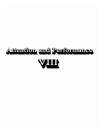Problem-solving assessment is an essential component of multi-tiered systems of support such as response to intervention (RTI) and positive behavioral interventions and supports (PBIS). This authoritative work provides a complete guide to implementing a wide range of problem-solving assessment methods: functional behavioral assessment, interviews, classroom observations, curriculum-based measurement, rating scales, and cognitive instruments. Prominent experts demonstrate the key role of assessment throughout the process of supporting at-risk students, from identifying academic and behavioral problems to planning and monitoring interventions. Several chapters include reproducible forms that can be downloaded and printed in a convenient 8 1/2′ x 11′ size.
New to This Edition
*Reflects current education policy and best practices.
*Seminal chapter on problem solving by Stanley L. Deno has been updated with a revised model.
*All chapters now discuss assessment in the context of multi-tiered systems of support.
*Chapter on working with culturally and linguistically diverse learners.
*Chapter on graphing student data.
See also Response to Intervention, Second Edition, by Rachel Brown-Chidsey and Mark W. Steege, which provides step-by-step guidelines and practical tools for implementing RTI schoolwide.
Tabla de materias
Foreword, Patti L. Harrison
I. IDEAL Problem Solving
1. Introduction, Rachel Brown-Chidsey and Kristina J. Andren
2. Problem-Solving Assessment, Stanley L. Deno
II. Identifying Problems
3. Ecological Variables in School-Based Assessment and Intervention Planning, Merilee Mc Curdy, Michael J. Coutts, Susan M. Sheridan, and Lindsay M. Campbell
4. The Role of Teacher Perspectives in Diagnostic and Program Evaluation of Academic Skills, Tanya L. Eckert, Elizabeth A. Koenig, Bridget O. Hier, and Lauren A. Arbolino
5. Population-Based Strategies for Identifying Schoolwide Problems, Beth Doll, Mary Kelly Haack, and Kristin Bieber
6. Considering Diverse Learner Characteristics in Problem-Solving Assessment, Craig A. Albers, Paige L. Mission, and Brittany Bice-Urbach
III. Defining Problems
7. Functional Behavioral Assessment: The Cornerstone of Effective Problem Solving, Mark W. Steege and Jamie L. Pratt
8. Conducting Problem-Solving Interviews, Kristina J. Andren
9. Conducting Systematic Direct Classroom Observations to Define and Assess School-Related Problems, Nathan H. Clemens, Edward S. Shapiro, and Allison L. Seibert
10. Behavioral and Academic Rating Scale Applications within the Problem-Solving Model, Randy T. Busse and Melody Yi
11. Identifying and Validating Academic Problems in a Multi-Tiered System of Services and Supports Model in a Time of Shifting Paradigms, Mark R. Shinn
12. The Role of Intelligence Testing in Understanding Students’ Academic Problems, Randy G. Floyd and John H. Kranzler
IV. Exploring and Applying Selected Interventions
13. Solution-Focused Psychoeducational Reports, Rachel Brown-Chidsey and Kristina J. Andren
14. The Administrative Role in Transforming Schools to Support and Guide Educational Interventions in an Era of Educational Reform, Mary Lynn Boscardin, Adam Garand, and Patrick Tudryn
15. Treatment Integrity Assessment within a Problem-Solving Model, Lisa M. Hagermoser Sanetti and Thomas R. Kratochwill
V. Looking at Effects
16. Visual Representation of Progress Monitoring and Academic Achievement Data, Jack A. Cummings and Rebecca S. Martínez
17. Evaluating Intervention Outcomes within Problem-Solving-Based Assessment, Craig A. Albers, Stephen N. Elliott, Ryan J. Kettler, and Andrew T. Roach
18. Student Success Stories, Mary Jean O’Reilly and Kevin Tobin
Sobre el autor
Rachel Brown-Chidsey, Ph D, NCSP, is Senior Academic Officer for Fast Bridge Learning and a faculty member in the Department of Educational and School Psychology at the University of Southern Maine. Prior to obtaining her doctorate in school psychology, she taught middle and high school history and special education for 10 years. Her research areas include curriculum-based measurement, response to intervention (RTI), multi-tiered systems of support (MTSS), and scientifically based instruction methods. Dr. Brown is coeditor of Assessment for Intervention, Second Edition: A Problem-Solving Approach and coauthor of Response to Intervention, Second Edition: Principles and Strategies for Effective Practice; RTI in the Classroom: Guidelines and Recipes for Success; and Practical Handbook of Multi-Tiered Systems of Support. In addition, Dr. Brown has authored articles about reading assessment and instruction as well as implementation of tiered instruction. She has consulted with numerous school districts to support RTI and MTSS implementation.
Kristina J. Andren, Psy D, NCSP, has practiced as a school psychologist in Maine schools since 2005. She served as Assistant Professor of Educational and School Psychology at the University of Southern Maine, and continues to be affiliated with the University as a supervising licensed psychologist for Psy D school psychology interns and practicum students and as a member of the School Psychology Advisory Board. Dr. Andren’s research interests include assessment and intervention within a multi-tiered systems of support (MTSS) framework. Her current work focuses on the application of MTSS methods–such as response to intervention–to reading initiatives, schoolwide practices, and dropout prevention.












